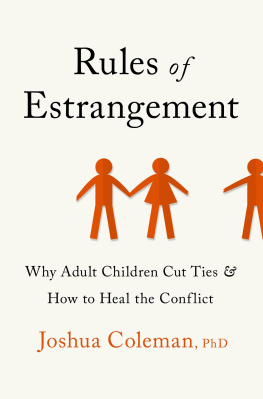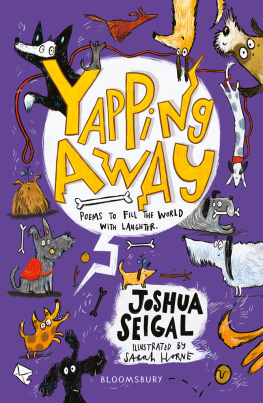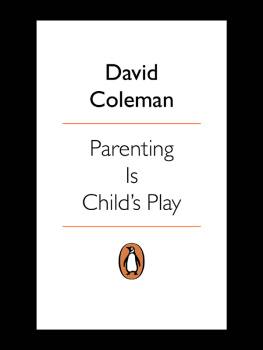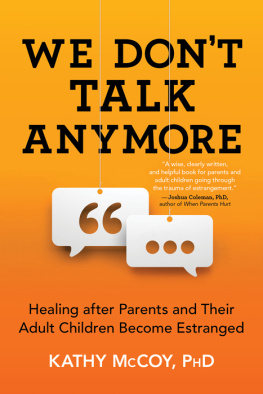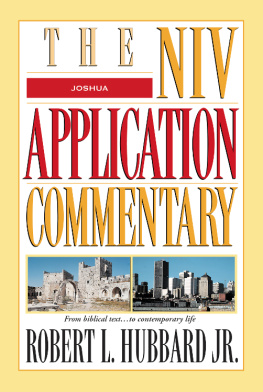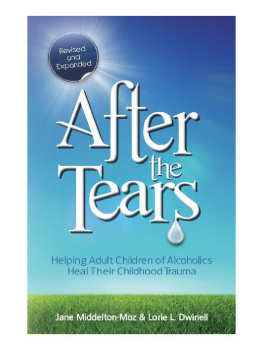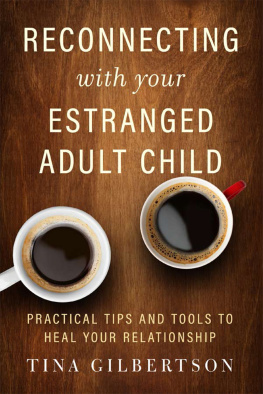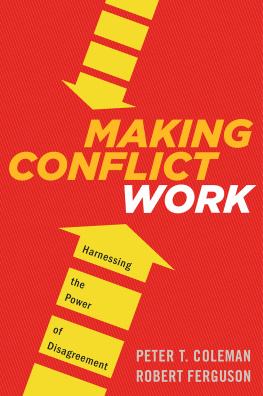Joshua Coleman - Rules of Estrangement: Why Adult Children Cut Ties and How to Heal the Conflict
Here you can read online Joshua Coleman - Rules of Estrangement: Why Adult Children Cut Ties and How to Heal the Conflict full text of the book (entire story) in english for free. Download pdf and epub, get meaning, cover and reviews about this ebook. year: 2021, publisher: Potter/Ten Speed/Harmony/Rodale, genre: Home and family. Description of the work, (preface) as well as reviews are available. Best literature library LitArk.com created for fans of good reading and offers a wide selection of genres:
Romance novel
Science fiction
Adventure
Detective
Science
History
Home and family
Prose
Art
Politics
Computer
Non-fiction
Religion
Business
Children
Humor
Choose a favorite category and find really read worthwhile books. Enjoy immersion in the world of imagination, feel the emotions of the characters or learn something new for yourself, make an fascinating discovery.
- Book:Rules of Estrangement: Why Adult Children Cut Ties and How to Heal the Conflict
- Author:
- Publisher:Potter/Ten Speed/Harmony/Rodale
- Genre:
- Year:2021
- Rating:5 / 5
- Favourites:Add to favourites
- Your mark:
- 100
- 1
- 2
- 3
- 4
- 5
Rules of Estrangement: Why Adult Children Cut Ties and How to Heal the Conflict: summary, description and annotation
We offer to read an annotation, description, summary or preface (depends on what the author of the book "Rules of Estrangement: Why Adult Children Cut Ties and How to Heal the Conflict" wrote himself). If you haven't found the necessary information about the book — write in the comments, we will try to find it.
Joshua Coleman: author's other books
Who wrote Rules of Estrangement: Why Adult Children Cut Ties and How to Heal the Conflict? Find out the surname, the name of the author of the book and a list of all author's works by series.
Rules of Estrangement: Why Adult Children Cut Ties and How to Heal the Conflict — read online for free the complete book (whole text) full work
Below is the text of the book, divided by pages. System saving the place of the last page read, allows you to conveniently read the book "Rules of Estrangement: Why Adult Children Cut Ties and How to Heal the Conflict" online for free, without having to search again every time where you left off. Put a bookmark, and you can go to the page where you finished reading at any time.
Font size:
Interval:
Bookmark:
ACKNOWLEDGMENTS
I want to start by thanking my fabulous editor at Harmony, Michele Eniclerico, for seeing the value of a book where theory, research, self-help, and a touch of memoir all meet at one place. I am grateful for her ability to show me how and where to pull back when I most needed it and to allow me to stretch out where I wanted to. Heartfelt thanks also to my agent, Helen Zimmerman, for her ability to quickly shape my massive book proposal into something that publishers would find compelling rather than overwhelming. I appreciated her availability and guidance throughout the process of finding the right home for this book.
My friends and colleagues at the Council on Contemporary Families have been an ongoing source of inspiration and support for the past twenty years. Historian Stephanie Coontz not only read every chapter but provided her famous ruthless edits for those places that desperately needed it in the early drafts. She was a careful watchdog to ensure that the historical assumptions I made were grounded in fact, and I cant think of a better person to have had review this. Phil and Carolyn Cowan were helpful in many ways. First by helping me construct my survey, which was completed by 1,621 estranged parents. As important, they individually gave me detailed notes on every chapter. Phil and Carolyn have contributed enormously to the field of psychology and I am forever grateful to have had their help. Frank Furstenberg also generously read through the manuscript and met with me to discuss it. He also helped me to address and correct those places in the book where my clinical opinions were sometimes at odds with the sociology research. Sociologists Paula England, Eva Illouz, Barbara Risman, Jennifer Silva, Judith Stacey, and Amy Schalet provided valuable insight and perspectives by either meeting with me in person or speaking on the phone. Historians Paula Fass, Steven Mintz, and Steven Vincent also generously gave of their time to help me locate the problem of estrangement from a historical perspective. I feel so fortunate to have received their help.
Michelle Kuo gave me unstinting support and critical feedback throughout the manuscript. I am grateful for her ideas and encouragement to put more of my own experience on the page. I am in awe of her writing and am so grateful that she was part of my team.
Profound gratitude to Virginia Roosevelt of the Donner Foundation, who approached me about funding a study on parental estrangement. As a result of their generous grant I was able to create and run my survey, which is currently one of the largest ever done on parental estrangement. Big thanks to Kelly Elver, John Stevenson, and Nathan Jones at the University of Wisconsin Survey Center for helping me with the study. Especially to Nathan who helped me to structure and administer my questionnaire and manage the 1,621 completed surveys. He tirelessly answered and addressed my many, many questions, and I learned a lot from him.
My science book club with Hal Cox, John Ericson, Chris Knudsen, and Bruce Onisko has been going on for fifteen years and is a great source of ongoing support for ideas and discussion. The UC Berkeley Family Book Group, which has been meeting for over thirty years, welcomed me as a member several years ago, and I have benefited from the wealth and diversity of ideas and the scholarship of its members.
I am grateful to Becca Bland for reading through the whole manuscript and providing feedback and friendship. And for partnering with me on our project to increase public awareness about family estrangment. Deep thanks to developmental psychologist Lucy Blake for her overnight feedback about my chapter on siblings as my deadline was loomingI am grateful to have had her input. Also to Liz E. Bates for speaking to me about her research on intimate terrorism in romantic relationships. Special thanks to psychologist Diane Ehrensaft for her priceless feedback about my section on gender identity and transitioning. She is a leader in the field, and I am grateful for her clarity and scholarship. Attorneys Brian Ludmer and James Karl provided insights into the legal challenges for parents trying to counter parental alienation, while attorney Peter Myers provided valuable insight into the many complications of estate planning in the context of estrangement. Amanda, who founded Grandparent Alienation Anonymous, has been an ongoing source of inspiration and education for grandparents who are faced with the trauma of being cut off from their grandchildren. Thank you for your tireless advocacy. Deep thanks to Marsha Mayer and Helen Wilson for providing their unique perspectives on estrangement and alienation.
I have learned so much from psychologist Jamie Edmund, whom I mention in my introduction. She has been a consultant to my practice for over twenty years, and we continue to have weekly meetings. Her wisdom and ideas are woven through all of my books. She consistently provides me with a unique angle into humanity grounded in understanding, compassion, and empathy.
They say that youre a composite of your closest friends, and if thats the case, its a rich tapestry to draw from. Massoud Badakshan, Jessica Broitman, Tommy Cramer, Dan Fitting, Joel Kramer, John Kunze, Mark and Lisa Levine, Seth Neiman, Jennifer Palangio, Paul Pilliterri, Richard Sullivan, Shari Bashin-Sullivan, Mary Sylvia, and Katherine Vincent are family to me and make my life so much more fun, rich, and meaningful.
Many thanks to my older and younger brothers for their ongoing friendship and companionship, and to my cousin who has been like a sister to me.
Of course, profound love and gratitude to my wife of over thirty years, Ellie Schwartzman. She listened patiently to my obsessions about what should or could be included, deleted, reframed, or considered for the book. Its helpful to have a fellow psychologist in the familyespecially one whos so kind and perceptive.
To my three grown children and my grandson for all the obvious reasons. Especially to my daughter for our reconciliation. As any formerly estranged parent knowsthere is no greater gift that a child can provide a parent, and Im forever grateful.
And to the reader, may you find a way back to your child, your grandchild, and your happiness.
AFTERWORD
The truest form of wealth is social, not material.
Jonathan Rauch, The Happiness Curve
M y parents belonged to the last generation of unworried middle-class parents. They didnt worry about the corruptive power of their authority, didnt base their self-esteem on how they fared as parents, didnt obsess about my future. My brothers and I consumed hours of television and ate a staggering amount of sugarfor breakfast. We vanished in summer morningsbiked back for lunchand disappeared till dusk. There were no curious and intrusive neighbors offering unsolicited advice about how to be even more restrictive of our whereabouts. It was the gilded age before the concept of toxic parents captured the national imagination.
My parents also had a life. My mother played mah-jongg and bridge weekly with the girls (her Temple Sisterhood friends), and Mom and Dad went out every weekend without calling it date night. My dad played squash on weekends at the downtown YMCA and didnt worry about whether my brothers and I felt neglected. They were as luxuriously removed from our minds as we were theirs. There was no Internet broadcasting a little shop of daily horrors: a kidnapping in Saskatchewan, a childs murder in Booneville, a teens failure to launch coming to a city near you if you didnt get it right.
As young parents in the mid-1950s, my mother and father were influenced by the more permissive, laissez-faire attitudes of Benjamin Spock than by the austere, punitive dictates of the behaviorists who preceded him. And while they didnt spank us, we knew the look that told us that wed better back off or suffer the consequences. They were friendly, but we knew where we stood in the order of things and didnt mistake who had the authority in the household. We were also lucky, since many parents of the day still took parental authority as a license to be controlling or physically abusive.
Font size:
Interval:
Bookmark:
Similar books «Rules of Estrangement: Why Adult Children Cut Ties and How to Heal the Conflict»
Look at similar books to Rules of Estrangement: Why Adult Children Cut Ties and How to Heal the Conflict. We have selected literature similar in name and meaning in the hope of providing readers with more options to find new, interesting, not yet read works.
Discussion, reviews of the book Rules of Estrangement: Why Adult Children Cut Ties and How to Heal the Conflict and just readers' own opinions. Leave your comments, write what you think about the work, its meaning or the main characters. Specify what exactly you liked and what you didn't like, and why you think so.

